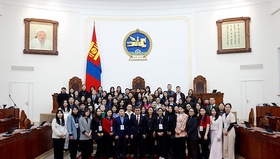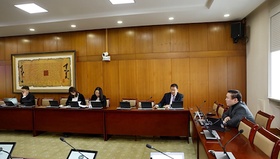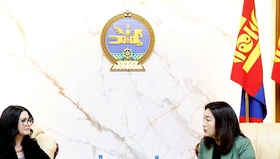The Second Regional Seminar for the Asia-Pacific RegionParliaments on Achieving the SDGs was successfully co-organized by the StateGreat Hural (Parliament) of Mongolia and the Inter-Parliamentary Union (IPU) inUlaanbaatar on May 27-28, 2019.
In regard, the following press release was sourced fromthe Inter-Parliamentary Union’s official website.
29 May 2019
Eighteenparliaments from the Asia-Pacific region met in Ulaan Bataar, Mongolia, from 27to 28 May 2019, to assess their country’s progress in implementing theSustainable Development Goals (SDGs). According to data from the UnitedNations, the region is lagging behind others in implementing the SDGs, with nocountry on track to achieve SDG targets by 2030.
Parliaments havebeen engaging with the SDGs more than with their predecessors, the MillenniumDevelopment Goals. They have also recognized that many SDGs, for example thoseconcerned with the environment, require going beyond national borders andseeking regional cooperation. The IPU, as the global convener of parliaments,has held over 20 regional SDG seminars over the last few years, as well asseveral national ones.
The seminar in Mongoliaprovided an opportunity for parliaments from the region to report on theirprogress and build on recommendations from the first seminar held in theregion, in Viet Nam in 2017.
The cross-cuttingtheme of the seminar was the importance of education, an issue that had beenhighlighted in the recent Doha Declaration,adopted by MPs at the 140 IPU Assembly in April. In theMongolia seminar outcome document, MPsacknowledged “that ensuring quality education is central to the achievement ofall SDGs and in breaking the cycle of poverty”. Giving access to qualityeducation, in particular to the most vulnerable sections of the population—suchas marginalized groups, women, and stateless people—can help lift them out ofpoverty by, for example, allowing them to apply for better-paid jobs.
Other topics on theagenda included health, climate change and citizens’ involvement inimplementing the SDGs. Participants stressed the importance of education inimproving the health of communities. They agreed to build political will andcommitment to achieving Universal Health Coverage and sustainable healthsystems.
They also examinedhow environmental literacy can build a culture of climate change prevention andraise awareness of climate change and disaster reduction. To do so, the outcomedocument calls for MPs “to maximize their roles as legislators and overseers”and increase regional and global cooperation with a view to sharing informationand experiences.
Citizen engagementis important to create a sense of national ownership of the SDGs. Participantsdiscussed innovative ways in which to do this, including mechanisms throughwhich citizens could provide feedback to policymakers on the achievement of theSDGs.
Speaking at theopening, IPU President Gabriela Cuevas Barron said, “The Asia Pacific region ishome to more than half the world’s population. As parliamentarians, we have acritical role to play to ensure that government actions are inclusive andtransformative for those whom we represent. The SDGs cannot be achieved ifcertain groups in society are ignored. They are for everyone.”
As part of thepreparation for the seminar, the Mongolian Parliament launched a localtranslation of the IPU- UN Development Programme (UNDP) self-assessment toolkit on SDGs.The Mongolian translation joins seven other language versions of the tool kit,demonstrating its global usefulness for parliaments.
Also present at theseminar, the Fiji parliament launched a guidance note on integrating the SDGsacross the work of all its parliamentary committees with support from the IPUand UNDP.

 Eng
Eng  Монгол
Монгол

